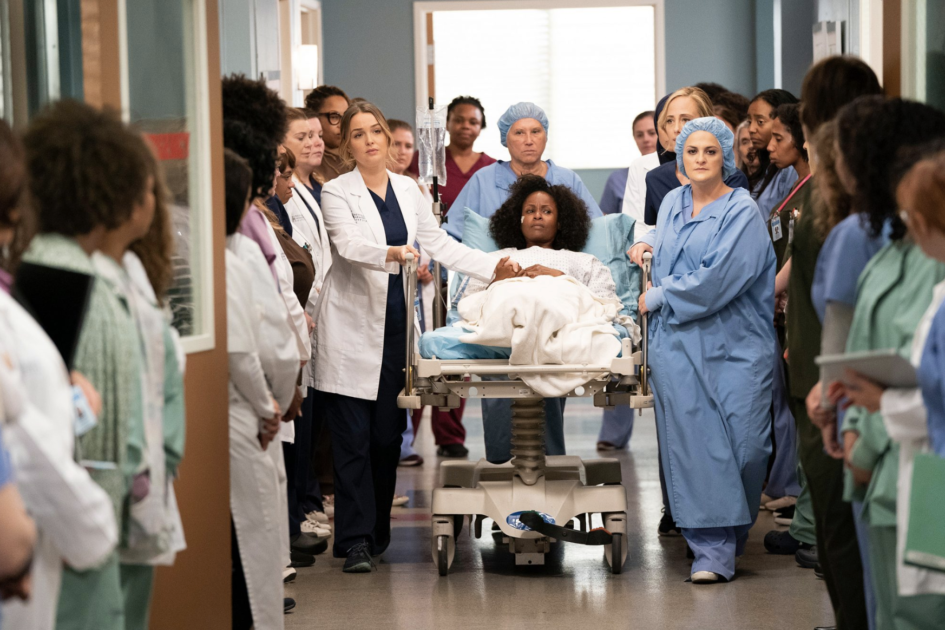
Photo credit: ABC, Grey’s Anatomy
Grey’s Anatomy is no stranger to powerful, moving episodes. The show, which is in its 15th season, has tackled everything from school shootings and addiction, to trans rights and racism. However, the most recent episode, aptly titled, “Silent All These Years,” tackled the unfortunately relevant issue of consent and sexual abuse.
The episode essentially told three stories all relating to the importance of understanding, and acknowledging, consent. Miranda and Ben having “The Talk” with Tuck, Jo finally coming face to face with her birth mother, and a patient named Abby who arrived at Grey Sloan after a life-changing night.
Each of these storylines on Grey’s Anatomy spoke to the topic in its own way. Miranda, upon finding out that Tuck and a girl were “talking” (aka dating in 2019 terms), realized she needed to talk to him about respect, consent, and yes, even condoms. Ben offered to do it, and he and Tuck had the conversation over burgers. Ben put it simply: in sports when someone calls “time out,” there’s no discussion. It’s just accepted. Basketball players stop dribbling, football players take a knee, catchers remove their mitts. All physical play stops. Well, that’s what consent is. The minute the person you’re with is no longer having fun, you stop. The minute they change their mind (which they’re allowed to do), it’s over. It was such a simple explanation, because well, it really should be that simple.
Then there’s Jo. Her storyline had essentially been building to her discovering, and ultimately meeting, her birth mother. It finally happened and she learned that she was the product of her mother being raped by her TA in college. The way Camilla Luddington balanced the range of emotions Jo felt in this moment is incredible to watch. She switched back and forth between anger, for being left behind, and compassion for her mother’s trauma. Watching her try to reconcile that her very existence came as the result of something so tragic and painful, was heartbreaking.
What made it even more painful was that upon her return to work she literally walked into a patient, Abby, coming to terms with her own trauma. At first, Abby claimed she walked into a cupboard, but Jo knew better. She’s been a victim of violence, too. Jo asked Teddy for a consult and it was quickly realized that Abby was a victim of sexual assault. After ruling out her husband, it was revealed she was attacked by a stranger. When asked if she wanted to report it, she gave a powerful speech about all the reasons she couldn’t. The main one? She likely wouldn’t be believed. After all, she was drinking. She might have been giving off the wrong impression. She doesn’t want her rape kit to sit on a shelf untouched. It was a much-needed reminder of all the ways society victim blames, and victim shames. It was then that Jo shared her own story of abuse, careful not to compare injuries, but to empower Abby to take action. Abby may not want to press charges then, but one day she might. If and when that day comes, Jo wanted her to have everything in her power to seek justice.
It’s then that viewers saw, in excruciating detail, the steps victims of sexual assault have to go through to complete a rape kit. Photographs. Swabs. Probing. And verbally consenting to every step along the way. Watching a woman, who has just had her body violated, continue to be exposed, just truly puts the process in perspective. It shows their bravery. It further proves how they’re survivors.
Abby’s injuries ended up being so severe, that she needed surgery, but as she continued to deal with the aftermath of her trauma, she revealed that she sees her rapist’s face in any man she saw. She knew she needed the surgery, but she just didn’t know how to deal with that. So, Jo got every available woman at Grey Sloan to line the halls, physically blocking men from entering, and simultaneously surrounding Abby with strength and support. It was one of Grey’s most beautiful scenes and literally showed the impact we as a society could have if we not only believed survivors, but supported them.
Later, Teddy made a comment about Jo’s actions that day not following protocol. Jo began to apologize when Teddy cut her off and told her, “It should be.” Sure, Teddy was speaking about how Jo acted as a doctor, but she made a point for humanity as a whole. Empathy. Belief. Support. These are the rules we should be living by. These are the things that should be protocol.
For more articles and discussions, check out some of our other blogs here.

